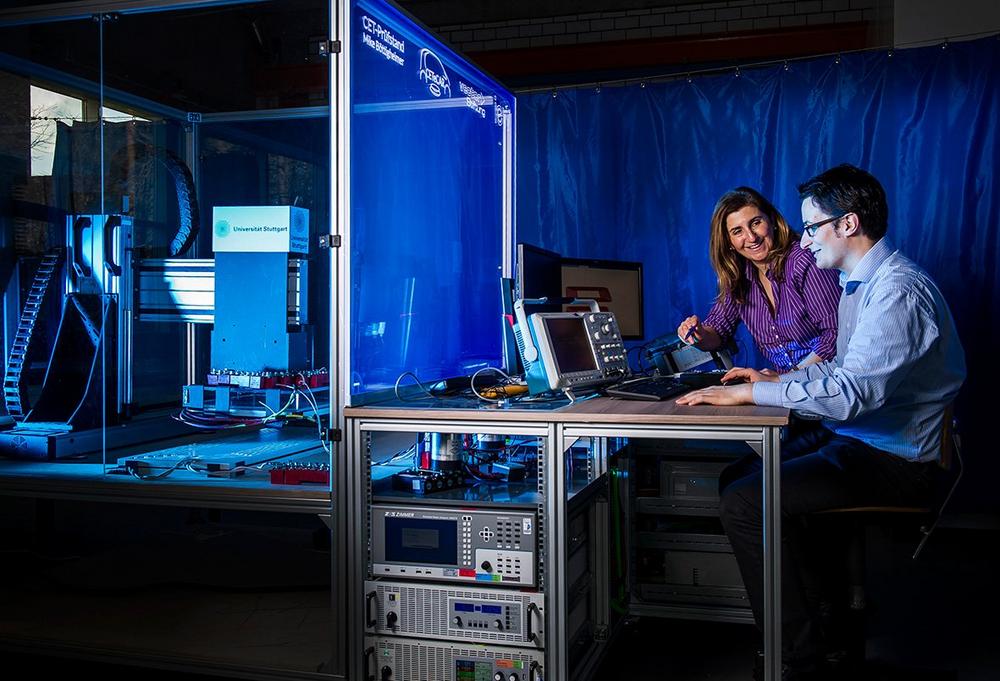A research team at the Institute of Electrical Energy Conversion (IEW) of the University of Stuttgart, which is headed by Prof. Dr. Nejila Parspour, has been focusing for years on the inductive energy transfer, among other things, of e-vehicles. Thanks to wireless charging, it is possible to automate the charging process, so that the rechargeable battery can be charged automatically at all times, for example in inner-city parking lots, at traffic lights, on selected road sections and while driving. The scientists at the IEW are researching the development of wireless electrical road systems with which commercial and passenger EVs can be charged without cables while driving or stationary. This is critical for increasing the range of electric vehicles. The efficiencies achieved with the systems developed at iew are over 95 percent.
Since public charging stations are still rare, inductive charging possibilities would also create more capacity – at relatively comparable costs. The e-vehicle could then be charged on the way to work and in the parking lot. It would no longer be necessary to plug the car in for charging all night, for example.
Prof. Dr. Nejila Parspour sees the greatest potential for further developments in analyzing the energy path. Contactless charging technology works using charging coils. For dynamic charging, i.e. while driving, induction coils will be put into the road surface. As soon as the vehicle is on top of them, the charging coils in the road are activated, and transfer electrical energy to the vehicle via a magnetic field. The scientific team around Prof. Parspour has already filed patent applications for different inventions in order to further advance the idea of inductive static and inductive dynamic charging. One of the most important inventions relates to positioning tolerance that allows for inductive charging regardless of the vehicle height and width.
A number of other inventions have further increased the efficiency of the systems developed at the IEW. Other already patented inventions relate to foreign body detection. This way, the charging system can detect when a foreign body that could heat up is on the induction coil. In addition, the scientists at the Institute for Electrical Energy Conversion are also conducting research in several projects funded by the Vector-Stiftung, including in the area of 48-volt-based charging while driving.
The IEW team is also working on the economic efficiency and size of components for charging systems. In addition to the infrastructure, i.e. the coils in the energy path, the receiver coils must also be built as light as possible with the greatest possible efficiency. The goal is to achieve a stable system with just a few components. This reduces costs, increases efficiency and saves installation space and weight, which is also an important factor for an electric vehicle.
EP applications are pending. Technologie-Lizenz-Büro (TLB) GmbH helps the University of Stuttgart patent and market its innovations. TLB has been commissioned with the business implementation of this pioneering technology and offers companies possibilities to cooperate and license the patents.
For more detailed information, please contact Innovation Manager Emmerich Somlo (somlo@tlb.de)
Creating value from ideas – Technologie-Lizenz-Büro (TLB) GmbH is an agency for invention and patent management in Germany. TLB accompanies inventions from universities, companies and inventors on their way from the first idea to the commercial product. As a partner of science and industry, TLB has been offering customised services and intelligent solutions in invention and patent management for more than 20 years.
Technologie-Lizenz-Büro (TLB) der Baden-Württembergischen Hochschulen GmbH
Ettlinger Str. 25
76137 Karlsruhe
Telefon: +49 (721) 79004-0
Telefax: +49 (721) 79004-79
http://www.tlb.de/
PR-Managerin
Telefon: +49 721/ 79004-0
Fax: +49 721/ 79004-79
E-Mail: asiller@tlb.de
![]()
